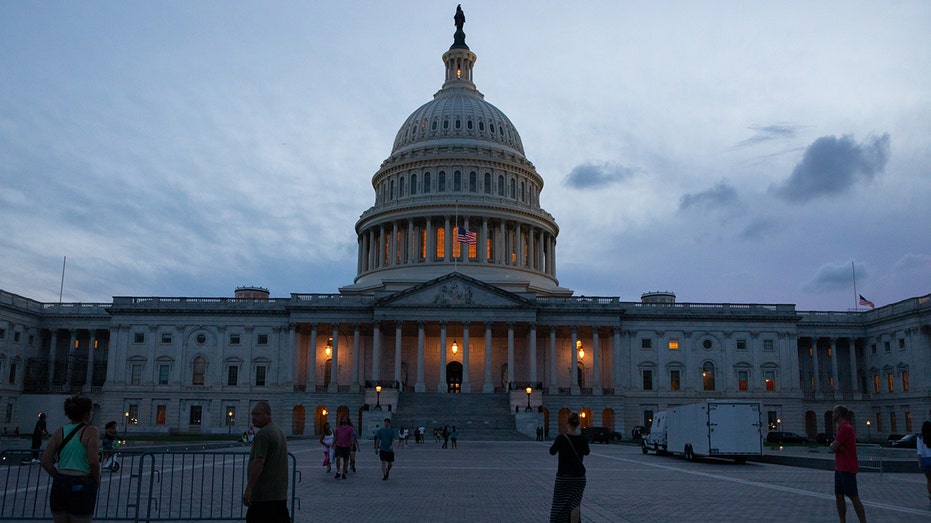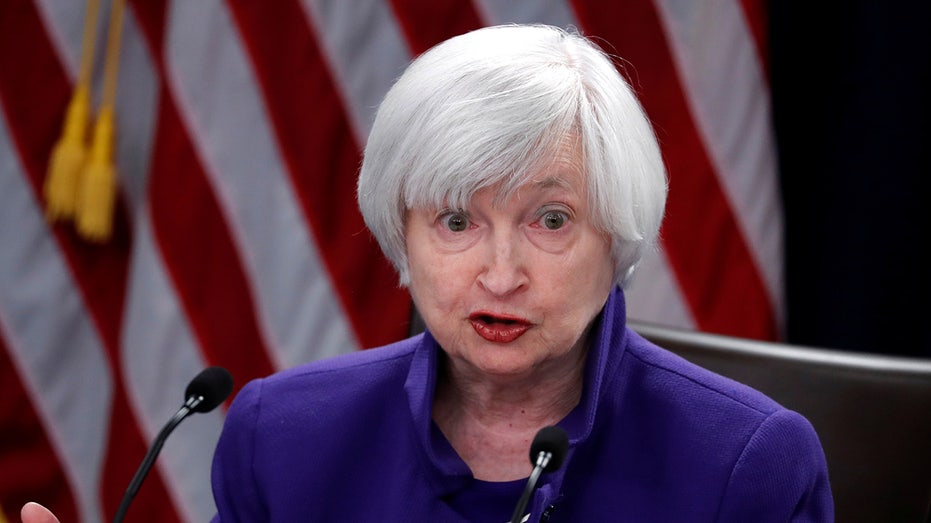Looming debt ceiling showdown risks triggering 'self-inflicted' recession for US economy
US to hit its debt limit Thursday; Treasury to deploy 'extraordinary measures'
Dan Clifton on debt ceiling: 'A lot of Republicans' won't support raising it
Dan Clifton, a Strategas partner and head of policy research, says Republicans have to start crafting a 'unified' debt ceiling plan now.
Wall Street is bracing for an impending fight on Capitol Hill over the federal debt limit, raising fears a showdown could send the already fragile U.S. economy into a recession.
Treasury Secretary Janet Yellen warned last week the U.S. will hit its statutory debt limit Thursday and that unless Congress takes swift action, the government may not be able to pay its bills as early as June.
The Treasury Department will begin deploying "extraordinary measures" this week to prevent the U.S. from defaulting on its obligations.

The U.S. Capitol building on the evening of Aug. 6, 2022 in Washington, D.C. (Anna Rose Layden/Getty Images / Getty Images)
The emergency moves should give Congress until at least early June to raise or suspend the country's current $31.4 trillion borrowing limit. Despite the warning from Yellen, neither Democrats nor Republicans have made any moves toward striking a deal on increasing the debt ceiling.
"Without a debt limit increase, suspension or removal, we believe Treasury would look to prioritize debt payments leading to delays in some other payments," said Gregory Daco, the chief economist at EY Parthenon.
"Still, in doing so, Treasury would need to balance the federal budget by ensuring that government outlays are equal to government revenues. This would mean an instantaneous cut to GDP worth around 4.5-5.0%, leading to a self-inflicted recession and risking severe financial market dislocations."
US NATIONAL DEBT ON PACE TO BE 225% OF GDP BY 2050, PENN WHARTON SAYS

Treasury Secretary Janet Yellen (REUTERS/Jonathan Ernst / Reuters Photos)
The growing uncertainty over the debt limit comes after Republicans reclaimed the House majority, bringing to an end the one-party control enjoyed by Democrats over the past two years and threatening to revive a game of brinkmanship over raising or suspending the debt limit.
House Speaker Kevin McCarthy, who won the gavel after 15 rounds of voting by making compromises with some of the party's most conservative members, has indicated Republicans could push for spending cuts to the federal budget before helping to raise the debt ceiling.
"Why a potential debt ceiling crisis? In trying to garner support for his election, House Speaker McCarthy provided conservative Republicans with a commitment to attach significant spending cuts to any increase or suspension in the debt limit," Daco said. "As such, while most policymakers would favor a clean raise in the debt ceiling, there is likely to be significant opposition to spending cuts by Democrats in the Senate."

If the U.S. failed to raise or suspend the debt limit, it would eventually have to temporarily default on some of its obligations, which could have serious and negative economic implications. (AP Photo/Patrick Semansky, File / AP Newsroom)
Still, McCarthy, R-Calif., has said Republicans "don't want to put any fiscal problems through our economy, and we won’t." He has also not ruled out raising the debt limit, pointing to a debt ceiling deal struck in 2019 between President Trump and Speaker Nancy Pelosi.
"I had a very good conversation with the president when he called me, and I told him I'd like to sit down with him early and work through these challenges," McCarthy said last week at a press conference.
Congress last voted in December 2021 to lift the debt ceiling, which is the legal limit on the total amount of debt that the federal government can borrow on behalf of the public, including Social Security and Medicare benefits, military salaries and tax refunds.

Rep. Kevin McCarthy, R-Calif., speaks during a television interview as the House considers President Biden's $1.85 trillion domestic policy package at the Capitol in Washington, D.C., Nov. 5, 2021. (AP Photo/J. Scott Applewhite / AP Newsroom)
GET FOX BUSINESS ON THE GO BY CLICKING HERE
If the U.S. failed to raise or suspend the debt limit, it would eventually have to temporarily default on some of its obligations, which could have serious negative economic implications. Interest rates would likely spike, and demand for Treasuries would drop; even the threat of default can cause borrowing costs to increase, according to the Committee for a Responsible Federal Budget.
While the U.S. has never defaulted on its debt before, it came close in 2011, when House Republicans refused to pass a debt-ceiling increase, prompting rating agency Standard and Poor's to downgrade the U.S. debt rating one notch.





















